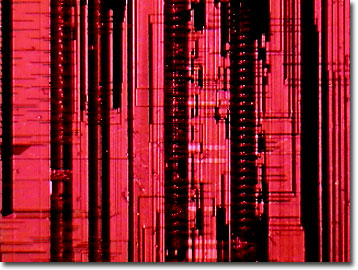Integrated Circuit Image Gallery
PowerPC 601 Microprocessor
The IBM/Motorola PowerPC 601, designed for personal computers and low-end workstations, was originally released in April 1993 with a clock speed of 50 MHz, a 64-bit external data bus, and a 32-bit address bus. Later versions were manufactured with 60, 66, 80, 100, and 135 MHz clock speeds as the four-layer silicon semiconductor manufacturing technique was refined to the 0.5-micron level.

View a second image of the PowerPC 601 processor.
Featuring a 32-Kbyte cache, a die size of 120 square millimeters, and 2.8 million transistors, the PowerPC 601 was named for the acronym-within-an-acronym POWER (Performance Optimization With Enhanced RISC -- Reduced Instruction Set Computing). Known also as the MC98601, the processor was used in 80 MHz versions to drive the Apple Power Macintosh and IBM RISC computers in late 1994. In June 1998, the PowerPC consortium (Apple, Motorola, and IBM) fell apart and Motorola bought out IBM's shares in the Sommerset PowerPC development center in Austin, Texas.
Running at only 3.6 volts and packing an impressive 23,333 transistors per square millimeter of silicon, the 601 processor, at the time of its release, was exceedingly fast at number crunching and was priced at about one quarter the amount of Intel's dominant Pentium microprocessor. One drawback that held the PowerPC family from reaching silicon stardom was the uncertainty about which operating system would prevail in the battle between consortium partners. Unlike most processors, the PowerPC 601 was not socket-mounted, but rather was assembled on a package that was directly soldered to the motherboard.
Contributing Authors
Omar Alvarado, Thomas J. Fellers and Michael W. Davidson - National High Magnetic Field Laboratory, 1800 East Paul Dirac Dr., The Florida State University, Tallahassee, Florida, 32310.
BACK TO THE INTEGRATED CIRCUIT IMAGE GALLERY
BACK TO THE DIGITAL IMAGE GALLERIES
Questions or comments? Send us an email.
© 1995-2025 by Michael W. Davidson and The Florida State University. All Rights Reserved. No images, graphics, software, scripts, or applets may be reproduced or used in any manner without permission from the copyright holders. Use of this website means you agree to all of the Legal Terms and Conditions set forth by the owners.
This website is maintained by our
Graphics & Web Programming Team
in collaboration with Optical Microscopy at the
National High Magnetic Field Laboratory.
Last Modification Friday, Nov 13, 2015 at 01:19 PM
Access Count Since September 17, 2002: 12432
Visit the website of our partner in introductory microscopy education:
|
|
